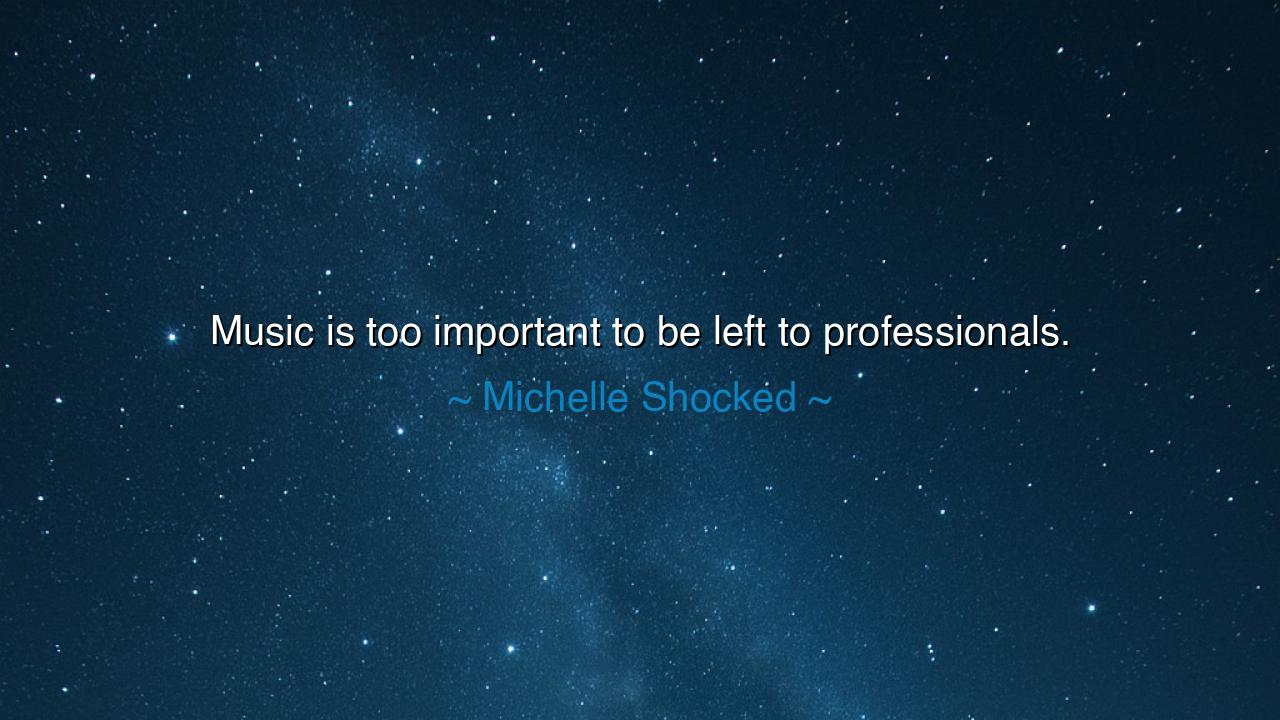
Music is too important to be left to professionals.






The singer and storyteller Michelle Shocked once declared with fierce conviction: “Music is too important to be left to professionals.” These words strike like a bell, reminding us that music is not the possession of the few, nor the treasure of elites, but the inheritance of all humanity. Her saying carries both defiance and love—defiance against the walls that separate performer from listener, and love for the truth that every heart is born with rhythm, and every soul with song.
To say that music is too important is to recognize its sacred place in human life. Music has always been more than entertainment; it is prayer, memory, resistance, and healing. Long before stages and recording contracts, there were mothers singing lullabies, workers chanting in the fields, warriors beating drums before battle, and elders passing history through song. Music has always been the language of the people, the current flowing through the lives of common men and women. Shocked’s words remind us that to confine it to “professionals” is to shrink something vast into something small.
Her warning is also against forgetting. When music is only consumed as product, sold to us by experts, we risk losing touch with its true power—the communal, participatory force that binds us together. Consider the folk songs sung in the American South during times of hardship. They were not created for profit, but as survival, as hope carried in melody. Or think of protest songs of the civil rights movement, sung not by trained professionals but by ordinary men and women marching for justice. Their voices, imperfect but united, shook the foundations of oppression. That is the power of music in the hands of the people.
Even history’s greatest figures understood this truth. Beethoven may have been a genius of craft, but he was also inspired by the songs of peasants and the rhythms of the street. Woody Guthrie, the wandering troubadour, carved into his guitar the words “This machine kills fascists,” and carried his simple songs into the hearts of working people. Their music was not polished alone in studios, but rooted in the soil of life itself. Shocked’s words echo their legacy: music must remain alive among the people, not caged within institutions.
The wisdom also carries a challenge. If music belongs to everyone, then no one is excused from participating. You need not be trained, you need not be flawless—your song is still sacred. Whether you sing in your home, play a drum at a gathering, or write words for your own heart, you are part of the great river of human expression. The value of music is not in perfection, but in authenticity. Its power is not in applause, but in its ability to awaken, heal, and unite.
The lesson, then, is this: do not leave music only to the professionals. Do not believe the lie that only the trained may sing or that only the polished may create. Music is life itself, and life belongs to all. Make it with your family, your friends, your community. Sing in joy and in sorrow, in triumph and in defeat. The greatest songs are not always the most beautiful, but the most true.
Practically, this means: find ways to bring music into your daily life. Play an instrument, even clumsily. Sing loudly, even off-key. Share songs with others, teach your children the music of your youth, and listen to theirs in return. Join your voice to the voices of others, for in the chorus lies strength. In doing so, you will reclaim what Shocked declared: that music is too important to be left to professionals, because it is, and always has been, the heartbeat of humanity itself.
So let these words endure as both invitation and command: make music, no matter who you are. Do not wait for permission. Do not wait for perfection. For the world does not need only stars on stages—it needs the song of its people, rising together like a tide that no power can silence.






AAdministratorAdministrator
Welcome, honored guests. Please leave a comment, we will respond soon